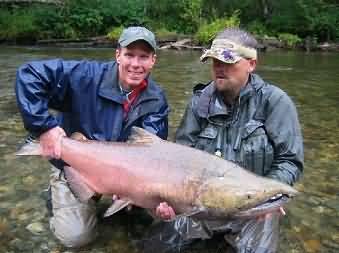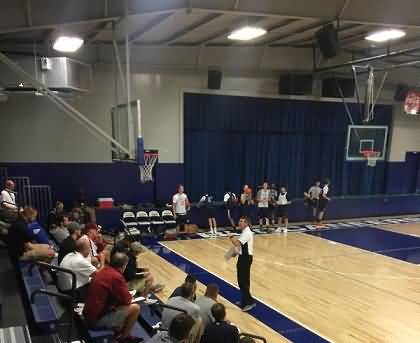What Basketball Coaches do in the Off-Season
From the Coach’s Clipboard Basketball Playbook"Helping coaches coach better..."
Coaches expect players to work in the off-season and make improvements. But what about us coaches? What are we doing in the off-season to help our team and to improve ourselves as coaches? Here are some ideas.
Take some time off
Maintain balance in your personal life. Right after the season is over, step back and forget about it for a couple weeks. Take time for your family and friends. Relax, enjoy life. As coach Al McGuire (Marquette U - National Champs) once said, "Don't let basketball be your mistress." Our families often take a back-seat once the season starts, so put your family first in the off-season.
Gonzaga coach Mark Few doing a "little" fishing
What are your own strengths and weaknesses?
Make an honest, private assessment of yourself as a coach, leader, mentor, etc. Do you need to improve your communication, teaching, organizational, and leadership skills? Do you need to be more open and willing to learn new things?Do you allow for enough interaction with your assistants? Are you representing your school and community in a positive way? Do you relate well to the school's administration and staff? Do you need to relate better to your players? How do you relate to parents and fans? Set some personal goals for yourself.
Evaluate the past season
Review your last-season's goals and how well you measured up. What worked and what didn't? Review stats to find areas that need improvement. Review game film and take notes on your players and your team. What has to get better?Review your system
Review your entire system... your man-to-man and zone offenses, your defenses, presses and press-breakers, special plays and out-of-bounds plays, drills, etc. What worked and didn't work this past season and why? What adjustments must be made in your defense and your offense?Think about next season's players, and what you can do to help each player become better. Can next season's players run your system, or do you need to adjust the system? Factors to consider are team-speed, bench depth, your post players, outside shooters, your point guard, etc. Ask your assistants to make their own lists, and then meet with them and discuss ideas openly.
Off-Season Camps and Clinics
If you have the time, attend a coaching clinic or two. Take notes and be open to learn new ideas. Interact with other coaches.
Attend a basketball clinic
Most high school teams will attend a few off-season team camps. Schedule good competition. You want to win some games and maybe lose a few. You don't want competition that is either too easy or too tough.
Run a young kids summer camp to help build your program for the future. Enlist the help of your assistants and players.
Use available resources to learn something new
Learn something new each off-season. Learn about a new offense or defense. Buy a DVD or a book and make notes. Think how this might help your team.Do you have a coaching mentor, an experienced (maybe even retired) coach who can act as your advisor and mentor? Young coaches will especially find such a person helpful... someone who has already made the mistakes, had the successes, and has been down the same road.
Involve your assistants
Do you have good, knowledgeable assistants who are willing to spend some time in the summer? Have a meeting with them. Let them run some of your summer camps. Let them suggest a new play or drill.Some head coaches will at times simply sit up in the bleachers and watch their assistants run things. This is good for your assistants, and you might learn a few things as well. Your players will respect your assistants more if they have more of an active role.
But again, this depends on your assistants... how knowledgeable, their passion, their loyalty and how much time they have to give. If you believe in and trust your assistants, you can take more time off and let them run a practice or camp.
Prepare for next season
We already discussed re-evaluating your system, plays, players, etc. Make the necessary adjustments for next season. What are your goals for the upcoming season? Now is the time to create a master practice plan, if you find that helpful.Meet with each player individually during the off-season. Discuss individual and team goals and your expectations.
The off-season is the time to organize a strength and conditioning program. See: Alan Stein's Basketball Strength, Conditioning, Agility, Quickness and Warm-Up Drills
Fix problems and fundamentals State athletic associations have rules regarding how much time you can spend with your players in the off-season, so make sure you understand the rules first. The off-season is a good time to try to correct individual shooting technique and other fundamental errors.
Experiment. A team camp or scrimmage is a good time to experiment with a player in a new role or a new position. For example, moving a player into the post, or a wing player to the point guard position, etc. The off-season is also a good time to try a new offense or defense. But don't show all your favorite plays in scrimmages.
Finally, going back to our first discussion point. Play golf, go fishing, take a family trip. Enjoy the off-season!
Also see Off-Season Basketball Workouts